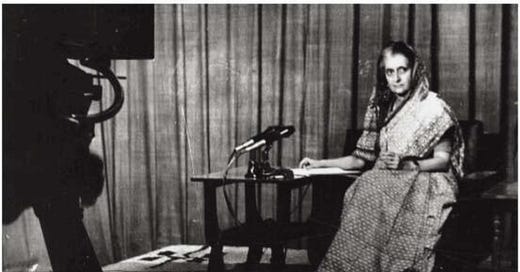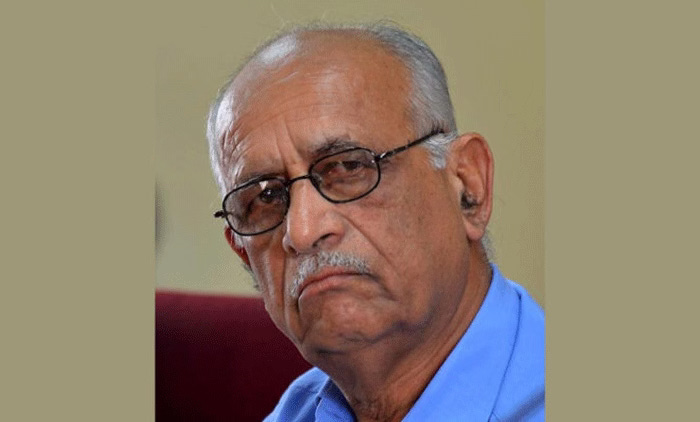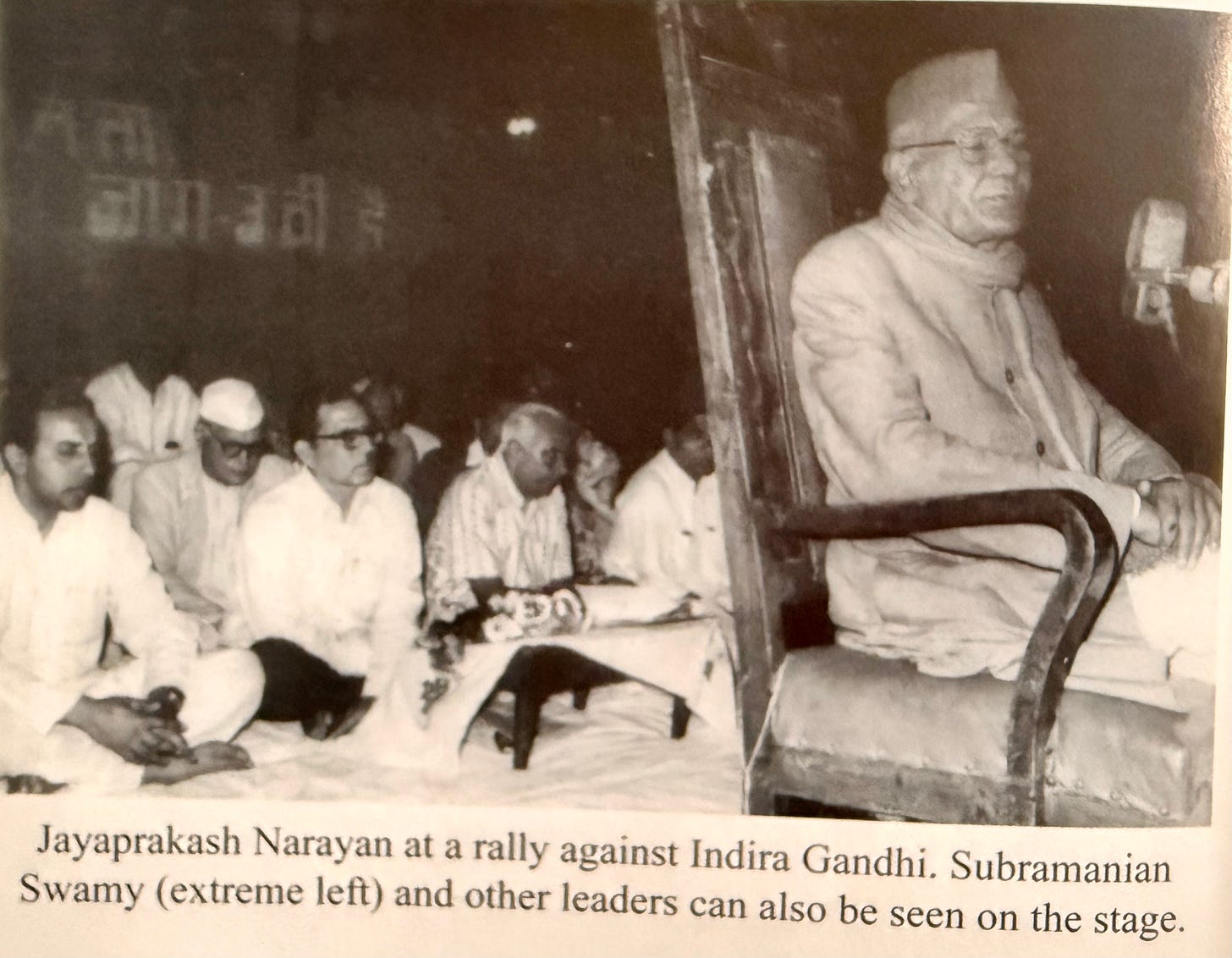'RSS was not against Emergency in 1975. Its leaders were not in jail protecting democracy. They only wanted ban lifted'
RSS supported Indira Gandhi's 20-point programme, and tried to sacrifice Subramanian Swamy, reveals BJP's first president in Karnataka
***
Indian newspapers are (correctly) marking the 50th anniversary of imposition of Emergency by the Congress government of Indira Gandhi in 1975 with acres of coverage. The mass arrests, the atrocities in jail, the media censorship, the forced sterilizations, should all be remembered so that India does not go down the path again.
But there is a double irony here.
One, the BJP-led NDA government of Narendra Modi has been no different, if not worse, in its treatment of critics of the regime and political opponents; the destruction of institutions; its disregard for the rights of citizens; the emasculation of the media; the treatment of Muslims and Dalits, etc.
And it has achieved all that without a whimper, and without having the need or courage to formally declare Emergency.
The other irony is BJP’s brazen appropriation of the resistance and opposition to Emergency. By labelling June 25 as “Constitution Murder Day”, BJP reveals its mind-numbing ignorance of the Constitution. And it seeks to paint the Rashtriya Swayamsevak Sangh (RSS) as a defender of democracy.
Which it was emphatically not.
A.K. Subbaiah, who was the first president of the Bharatiya Janata Party (BJP) in Karnataka in 1980, wrote a tell-all book in Kannada on the RSS, titled RSS Antharanga. Translated into English by Dr Hayavadana Moodusagri, Hidden Face of RSS provides an insider’s view of the shadowy organization.
In the book, Subbaiah, the first politician in Karnataka to be jailed during the Emergency in 1975, gives a first-hand account of the “role” played (or not played) by RSS during the dark days, and reveals that restoring democracy was the last thing on the minds of RSS leaders in those days.
It was all about their own survival.
***
By A.K. SUBBAIAH
There is a popular belief that, in the fight against Emergency, the RSS played a very important role. But in reality not even a finger was raised against Emergency by the RSS. Instead, by abjectly surrendering before Indira Gandhi they had tried their level best to free themselves.
It is true that many RSS workers were in jail during Emergency. That is not because they opposed the Emergency but because Indira Gandhi had imposed a ban on the RSS and the police sent whoever was caught to jail. Among them a few who escaped arrest were involved in underground activities.
Since a ban was imposed on their organization and many of their workers were sent to jail, it became inevitable for them to put up a fight. But their fight was not against the Emergency per se but against banning the RSS!
It is important to take note of this difference.
If one studies the literature produced by the RSS during their underground activities, it becomes very clear that their stress was on lifting the ban on the RSS and release of its members from jail. They never opposed the Emergency on the grounds that it was against democracy.
***
When I was in jail during the Emergency, I came to know that the RSS leaders had been trying to get the ban on their organization lifted by compromising with Indira Gandhi.
To that end they had chosen Eknath Ranade who was in charge of the Vivekananda memorial in Kanyakumari. He was assigned with the responsibility of meeting Indira Gandhi to discuss the issue. It was believed in RSS circles that Ranade was a person who had excellent practical knowledge and skills of diplomacy.
But Ranade’s attempts to meet Indira Gandhi and her son Sanjay Gandhi were in vain. Try as he might he could not meet either of them. RSS veterans, and BJP leader L.K. Advani were with me in Bangalore jail. When I heard them discussing this issue it became clear to me that they were not really against the imposition of Emergency.
Finally, the Congress came up with a proposal. It was that if the RSS made Dr Subramaniam Swamy surrender to the government then it would lift the ban on RSS. At that time Dr Swamy had fled to a foreign country and was involved in underground activities against Emergency.
I have no doubt in my mind that had Subramanian Swamy been in India the RSS people themselves would have caught hold of him and handed him over to the authorities so the the ban on them would be lifted.
***
During Emergency the then supreme leader of the RSS Balasaheb Deoras had been kept in the Yerwada jail. During that time he had written two letters to Indira Gandhi. These letters were made public in the legislative assembly of Maharashtra.
In one letter Balasaheb Deoras praises the 20-point programme which had been launched by Indira Gandhi and begs her to lift the ban on the RSS so that thousands of RSS workers who had been jailed could work on implementing her ambitious program.
In the second letter he congratulates Indira Gandhi for getting reinstated as a Member of Parliament by the Supreme Court. At that time all the champions of democracy across the nation were bitterly criticizing her for bringing a new law with retrospective effect so that she could be reinstated. By doing so she had once more destroyed democracy. Yet the supreme leader of RSS was congratulating Indira Gandhi on her illegal victory. What an irony!
Deoras had written those two letters of abject surrender in order to lay the ground to establish a compromise with Indira Gandhi. It was only after Deoras wrote those letters that Indira Gandhi agreed to meet Eknath Ranade.
RSS veterans discussed all these issues in front of me. That is how I came to know of all the hidden motives of the RSS.
***
During the Emergency I was in jail for 11 months with RSS people. Full time workers of the RSS were very happy inside jail, the reason being they found life in jail better than the lives they led outside. Even in jail they continued with the activities that they were doing outside. But those who were not full-time RSS workers broke down completely. It was not rare to see such RSS volunteers weeping loudly. A few of them became mad. If they had an option, they would have gladly submitted letters of confession and run away.
In Bangalore, one of the stalwarts of the RSS was arrested by the police under Defense of India Rule. He was a professor of mathematics at an engineering college. Since he was not arrested under the draconian MISA (Maintenance of Internal Security Act), he would have been released within a short period.
Yet he would be found wailing like a helpless woman. Whenever his second wife and child visited him in jail it would be pathetic to watch him. He would pester the jail officials to allow him to spend the day with his wife. I am recounting this to show that however much RSS speaks about character-building, their people are totally lacking in character.
But those who were not with the RSS but were associated with the Jan Sangh did not collapse in jail like RSS people did. This shows that those outside RSS are made of sterner stuff.
***
Even in jail, the RSS members were trying to impose their ideology and culture on others. Once, everyone was asked to assemble near a temple in the jail premises to pray for the wellbeing of Jayaprakash Narayan. Among those who had gathered there were members belonging to other political parties and religious communities. Yet, the RSS members behaved as if they were conducting an RSS programme. Not only that, an RSS prayer was imposed on all of us.
Jan Sangh members, Ananda Margis, rowdies, black marketeers, thieves etc were all in jail during Emergency. We all cooked our meals together, dined together and would have intense debates on many topics. There was no rift amongst us. But a few RSS leaders started imposing their rules on others. Before eating meals they ordered everyone to chant mantras. As a result, many people started cooking and eating separately. This only proves that RSS people can love only their culture. They cannot tolerate other cultures.
***
When I was in Bangalore Jail, a Muslim named Ismail was murdered in Kalladka, a place near Mangalore. The chief minister of Karnataka Devaraj Urs accused RSS people of committing Ismail’s murder. I was shocked upon hearing his accusation. A Corps of Detectives inquiry was initiated. Many RSS workers were arrested to brought to Bangalore jail. The high court dismissed the case later.
I was under the impression that Urs blamed the RSS to take political advantage. I could not believe that RSS men were behind it. But the truth was revealed to me after I started my own political party (Kannada Nadu). A few RSS boys in Kalladka rebelled and joined my party. Those boys revealed to me that RSS leaders had met secretly in many place to conspire to kill Ismail. The reason: a girl belonging to an RSS family was involved with the Muslim boy Ismail!
***
Excerpted from Hidden Face of RSS, by A.K. Subbaiah
Translated by Dr Hayavadana Moodusagri
Published by Lankesh Prakashana, 2015





